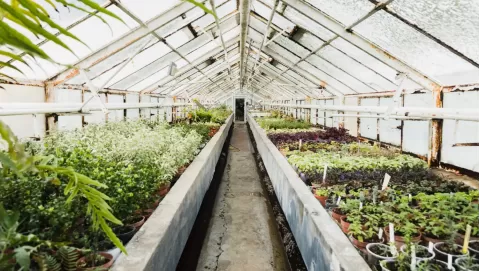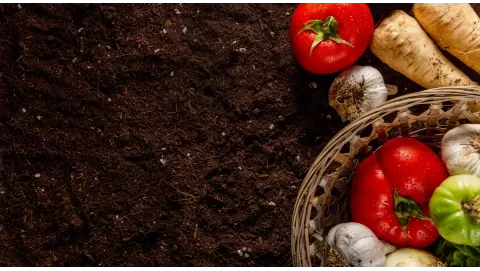
Bioline, Aquabella, BlackSmith, and Phycoterra's Role in Sustainable Agriculture and Plant Health
An important future for farming lies in sustainable agriculture, which is becoming increasingly important due to increasing food demands and the threats presented by climate change. Biological improvements are being used more and more to improve crop health and resilience while reducing environmental effects.
These enhancements use naturally occurring microorganisms, organic nutrients, and eco-friendly substances. Improved soil quality, better plant nutrition, and stronger natural defense systems are just a few ways that biological approaches in agriculture help farmers attain higher yields sustainably while contributing to a healthier ecosystem.

Farmers are turning to biological enhancements to improve growing conditions, including biostimulants such as fulvic acids and helpful microbes. Companies such as BioLiNE, Aquabella, Blacksmith Bioscience, and PhycoTerra are developing innovative solutions that promote crop vitality, soil nourishment, and water conservation.
What Are Biological Enhancements?
Biological enhancements refer to natural additives and solutions that improve plant health, soil quality, and overall crop productivity without the environmental impact of synthetic chemicals. These improvements incorporate a range of bio-based products that sustainably raise agricultural yields while harmonizing with the ecosystem. Essential forms of biological enhancements consist of the following:
- Microbes: Soil-dwelling beneficial bacteria and fungi that boost nutrient intake, plant resilience, and defense against disease.
- Organic acids: Soil-improving, nutrient-releasing compounds like fulvic and humic acids that also encourage plant development.
- Bio-stimulants: Seaweed extracts, amino acids, and helpful enzymes are all examples of bio-stimulants, which are compounds that promote plant growth, improve crop quality, and increase photosynthesis.
These biological innovations promote sustainable agriculture practices by integrating with nature instead of fighting it. By utilizing these all-natural solutions, you can improve your agricultural systems' resilience and reap the benefits for your crops and the planet.
Taking Sustainable Agricultural Practices for a Resilient Future
The adoption of sustainable agricultural practices is vital for enhancing food systems and promoting agricultural sustainability in the face of global challenges. By focusing on soil fertility and leveraging natural biological cycles, farmers can improve their yield while preserving essential natural resources. Practices such as organic farming not only mitigate the impact of plant diseases but also contribute to environmental sustainability by maintaining high environmental quality.
Additionally, integrating animal production practices with crop cultivation and implementing integrated pest management strategies fosters a holistic approach to farming, ensuring that both crops and livestock thrive. This comprehensive methodology not only enhances productivity but also supports the long-term health of our ecosystems, paving the way for a more resilient and sustainable agricultural future.
BioLiNE: Advanced Solutions for Optimized Crop Health
BioLiNE company's revolutionary fulvic acid products are revolutionizing agriculture by increasing crop health, resilience, and productivity on a massive scale. The company's flexible formulations, such as BioLiNE Gold, Emerald, and Platinum, offer customized solutions for crops throughout their whole growth cycle. How does BioLiNE help farmers be more resilient, efficient, and sustainable?
- Nutrient transport acceleration: BioLiNE solutions use their Dynamic Nutrient Exchange technology to speed up the transfer of nutrients from the soil to the roots, allowing plants to acquire critical nutrients when needed.
- Improved cell health: BioLiNE's fulvic acid products help crops maintain cellular electrochemical balance, improving nutrient uptake and aiding in efficient growth.
- Improved water use efficiency: Plants treated with BioLiNE are better able to retain water, which makes them more adaptable to different climates and requires less watering.
BioLiNE's science-driven products help plants grow stronger and more resilient, increasing crop yields. These products provide farmers with long-term solutions that work.
The Importance of Microbes in Farming
Soil microbes are essential for plant growth and soil health maintenance. Despite their diminutive size, these microorganisms play a significant role in farming:
- Nutrient cycling: Plants rely on microbes to decompose organic materials and release essential nutrients such as potassium, phosphorus, and nitrogen.
- Improved root health: Mycorrhizal fungi and other beneficial microbes establish symbiotic associations with plant roots, enhancing root health by increasing the roots' capacity to absorb water and nutrients.
- Pest and disease resistance: Reduced reliance on chemical pesticides and improved crop yields are two benefits of cultivating naturally resistant microbes to pests and diseases.
Farmers use microbes to boost the effectiveness of natural processes, improving soil health and plant resilience. These microbes also organically increase yields and protect plants from stress, making agriculture more sustainable and profitable.
AquaBella Company: Microbial Innovations for Thriving Crops and Clean Systems
Using modern microbial technology, AquaBella Company is revolutionizing sustainable agriculture by enhancing soil health, optimizing water quality, and safely clearing irrigation systems. AquaBella's natural microbial products bring the advantages of microbial therapies supported by research to contemporary farming methods.
Key AquaBella Products
- TerraBella Biostimulant Root Inoculant: TerraBella is a powerful blend of soil microbes that increases nutrient uptake, which in turn increases yields and improves crop quality. It works in both soil and hydroponic systems, making it perfect for farmers who care about the environment and their soil.
- Biofilm Buster Pro: Biofilm Buster Pro is an innovative, plant-safe technology that maintains clean irrigation systems all season. It removes buildup from emitters and lines to guarantee that crops always get adequate water.
- AquaBella Bio-Enzyme Water Treatment: A potent treatment for salt, fresh, and wastewater, AquaBella's Bio-Enzyme solution lessens phosphate levels, breaks down organic sludge, and reduces hazardous elements like ammonia and nitrates, fostering cleaner water systems and better plant environments.
AquaBella boosts plant development while preserving clean, efficient systems by combining rigorous science with natural chemicals. Their solutions are trustworthy and eco-friendly.
Improving Soil Health with Microbial Inoculants
Soil microbial inoculants are mixtures added to soil to increase the diversity and functionality of soil bacteria. There are several significant advantages to this method:
- Soil Structure Improvement: Microbial inoculants improve soil structure, aeration, and water retention by binding soil particles.
- Increased Nutrient Availability: Soil inoculants can boost nutrient availability, which means crops grow better in soil already rich with specific nutrients.
- Reduced Soil Degradation: Inoculants promote long-term soil health by developing a more stable and diverse microbial community, reducing soil compaction and degradation.
Mycorrhizae, other beneficial fungi, phosphate-solubilizing bacteria, and other microbes are examples of microbial inoculants that improve soil health and crop yields. Thanks to these biological treatments, sustainable soil health improvement is now within reach for farmers, opening the door to regenerative farming methods.
PhycoTerra Company: Revitalizing Soil Microbiomes for Optimal Crop Growth
PhycoTerra aims to improve soil health by feeding soil bacteria better so plants can reach their maximum potential. The business knows that many soil bacteria go dormant when nutrients are scarce, even though they would benefit plant growth. Soils and crops benefit from PhycoTerra's revolutionary microalgae-based products since they restore these essential organisms.
The Power of Microalgae
Nourishing the Microbiome: PhycoTerra products are made from microalgae and designed to nourish and energize soil bacteria.
Soil Improvements: Active microbes enhance soil function, improving water retention and nutrient availability.
Enhancing Crop Resilience: A balanced microbiome allows crops to handle abiotic stress better, leading to higher yields all season long.
Fulvic acid: A Biological Agent of Great Power
Decomposed organic matter is the source of the powerful natural chemical known as fulvic acid, which is highly regarded for enhancing soil quality and plant health. Fulvic acid, which is more well known as a "biological powerhouse," is involved in many aspects of crop yields:
- Nutrient transport: Fulvic acid improves the uptake of nitrogen, phosphorus, and potassium, which are building blocks for plant growth, and hence aids in nutrient transport.
- Root growth stimulation: When plants are stimulated to grow longer, stronger roots, they can reach deeper layers of soil for water and nutrients.
- Improved soil microbial activity: Fulvic acid encourages beneficial bacteria to multiply, leading to a more robust and harmonious soil ecology.
Soil amendments containing fulvic acid allow farmers to sustainably improve soil health, increasing plant vitality, agricultural yield, and resilience.
BlackSmith Company: Enhancing Sustainable Agriculture through the Usage of Microbes
BlackSmith BioScience's mission is to transform farming by harnessing the potential of helpful microbes. In addition to supporting environmentally responsible farming methods, their innovative products improve plant health, crop output, and fertility. Helping farmers grow successful crops with minimal chemical inputs is our top priority, and we're dedicated to finding natural solutions for this problem.
- Key Products from BlackSmith
- Armory SP - Bacteria Blend
- MegaPhos SP - Phosphorus Solubilizing Microbe
- Nitryx SP - Nitrogen Fixing Microbe
- NoFly WP - Biological Insecticide
- Tenet WP - Disease Control
- WarHammer - Disease Control
Increasing Crop Resilience Through Biologicals
Biological solutions can significantly increase crop resilience without synthetic pesticides, allowing plants to endure various environmental challenges. To strengthen the body's inherent defenses, biologicals collaborate with soil and plants:
- Improved drought tolerance: Specific biostimulants and microbial inoculants help plants retain more water, improving their drought tolerance and enabling crops to grow in extremely dry environments.
- Pest and disease resistance: Biological agents such as beneficial bacteria and fungi are a natural line of defense, protecting plants from dangerous infections and decreasing the need for pesticides.
- Stress adaptation: Seaweed extracts and other bio-stimulants make plants more resilient by increasing their capacity to withstand high and low temperatures.
These biological tools allow farmers to create more vital crops that can withstand harsher environments, increasing yields and ensuring more consistent harvests.
Maximizing Nutrient Utilization and Enhancing Biological Function
Plants can make the most of the nutrients in soil and fertilizers when nutrient use efficiency (NUE) is optimized, and biological improvements play a vital role in this process. As a result, crop yields improve, and chemical fertilizers are less needed:
- Improved nutrient uptake: Microbial inoculants and biostimulants enhance root-level nutrient absorption, making the most of administered fertilizers.
- Reduced nutrient runoff: Biomass' ability to bind soil nutrients reduces nutrient runoff into neighboring water sources and minimizes leaching.
- Efficient use of resources: By enhancing NUE, farmers can boost crop yields while decreasing fertilizer input costs and bolstering sustainable farming practices.

By incorporating biological innovations into nutrient management, growers may improve crop quality and output while making farming more environmentally friendly. This approach tackles issues related to both agriculture and the environment.
Wrapping Up
Biological improvements are a major step toward more environmentally friendly farming methods. Companies like BioLiNE, AquaBella, BlackSmith, and PhycoTerra have developed innovative approaches that use nature's forces to maximize crop health, soil quality, and water conservation. By using organic inputs and naturally occurring microbes, farmers can boost crop yields and aid in ecosystem restoration and maintenance.
The advantages of biological upgrades go beyond just increasing output; they also make farms more resilient to environmental stresses, less reliant on synthetic chemicals, and more sustainable in the long run. The long-term sustainability of agriculture depends on adopting these ecological solutions in response to increasing food demands and more severe climate threats.
Disclaimer: This material is for informational purposes only and should not be relied on for legal, medical, financial, or other professional advice.


.jpg?1730134544501)

.jpg?1730124727741)



















